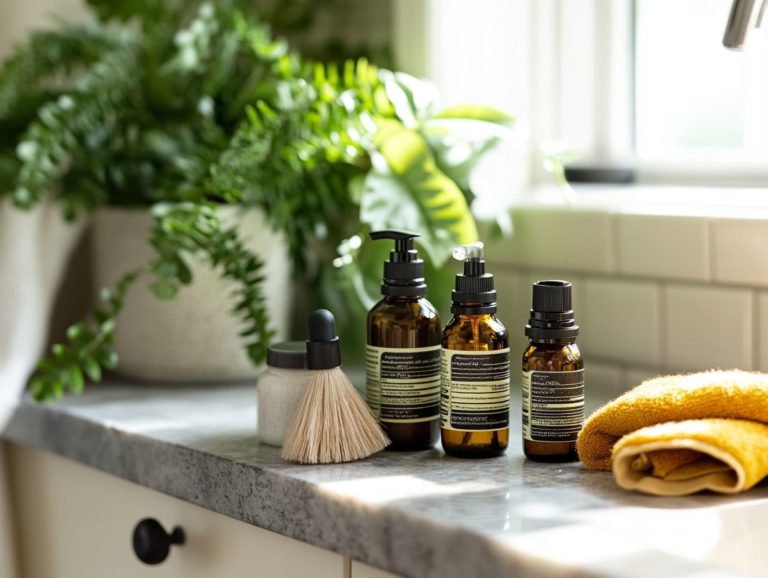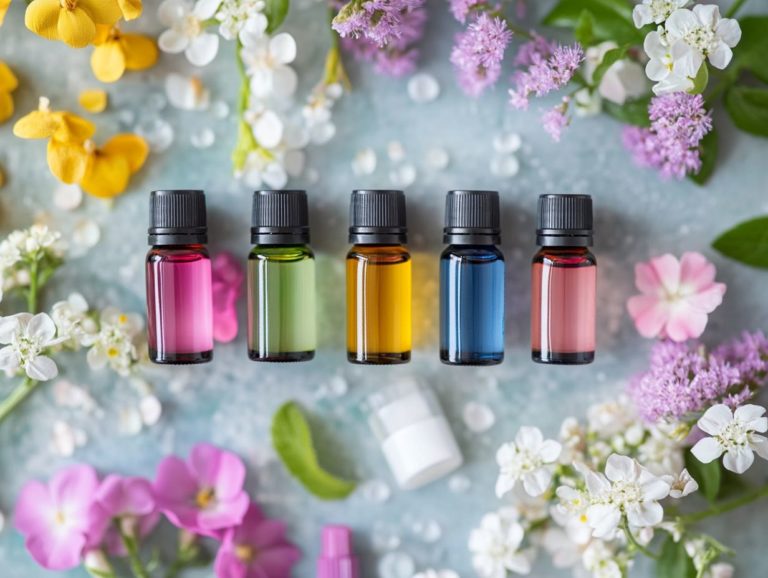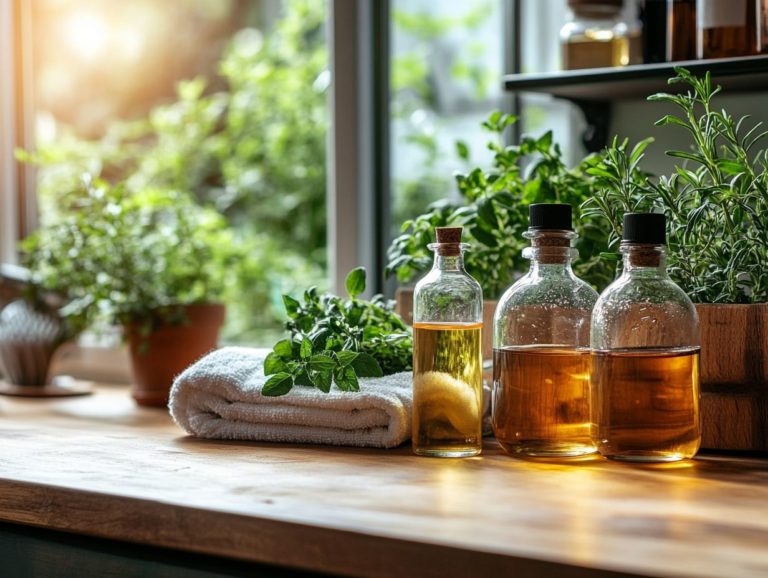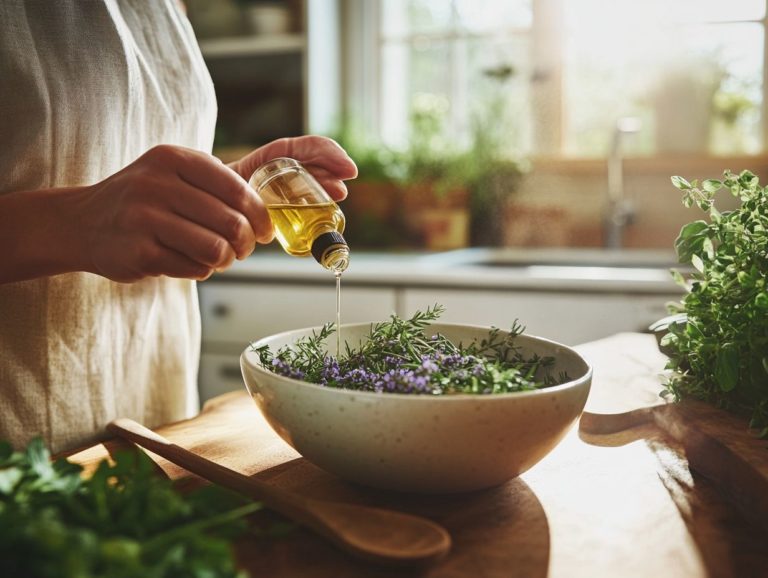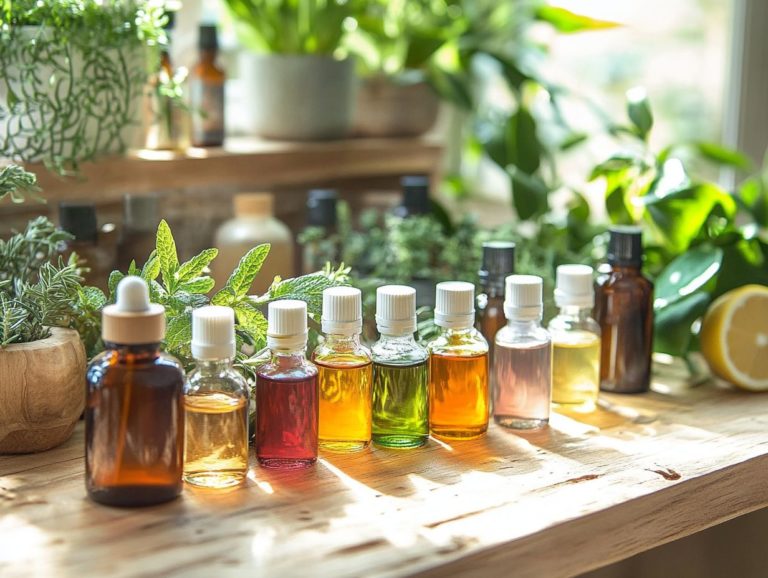Essential Oils for Stain Removal: What to Know
Stains are a part of life that you simply can t escape, but the process of cleaning them doesn t have to rely on harsh chemicals or traditional cleaners.
Essential oils, with their remarkable natural properties, can serve as a powerful ally in your quest to tackle various stains throughout your home. These natural alternatives are effective and versatile.
Whether you re dealing with oil-based marks, ink spills, food mishaps, or stubborn odors, you ll discover how these aromatic oils can help you refresh your fabrics and surfaces to their former glory.
You ll explore which essential oils are most effective, learn how to use them for optimal results, and consider important safety precautions to keep in mind. Prepare to harness the power of nature to create a cleaner, fresher home! Plus, get valuable laundry tips and understand the benefits of using eco-friendly products over harsh cleaners.
Contents
- Key Takeaways:
- What Types of Stains Can Essential Oils Remove?
- Which Essential Oils are Best for Stain Removal?
- How to Use Essential Oils for Stain Removal?
- Are There Any Risks of Using Essential Oils for Stain Removal?
- Frequently Asked Questions
- What are some laundry tips for using essential oils?
- Can I use essential oils for stain removal?
- Which essential oils work best for stain removal?
- How do I use essential oils for stain removal?
- Are there any precautions to take when using essential oils for stain removal?
- Can essential oils be used on all types of stains?
- Do essential oils leave a scent on the fabric after stain removal?
Key Takeaways:
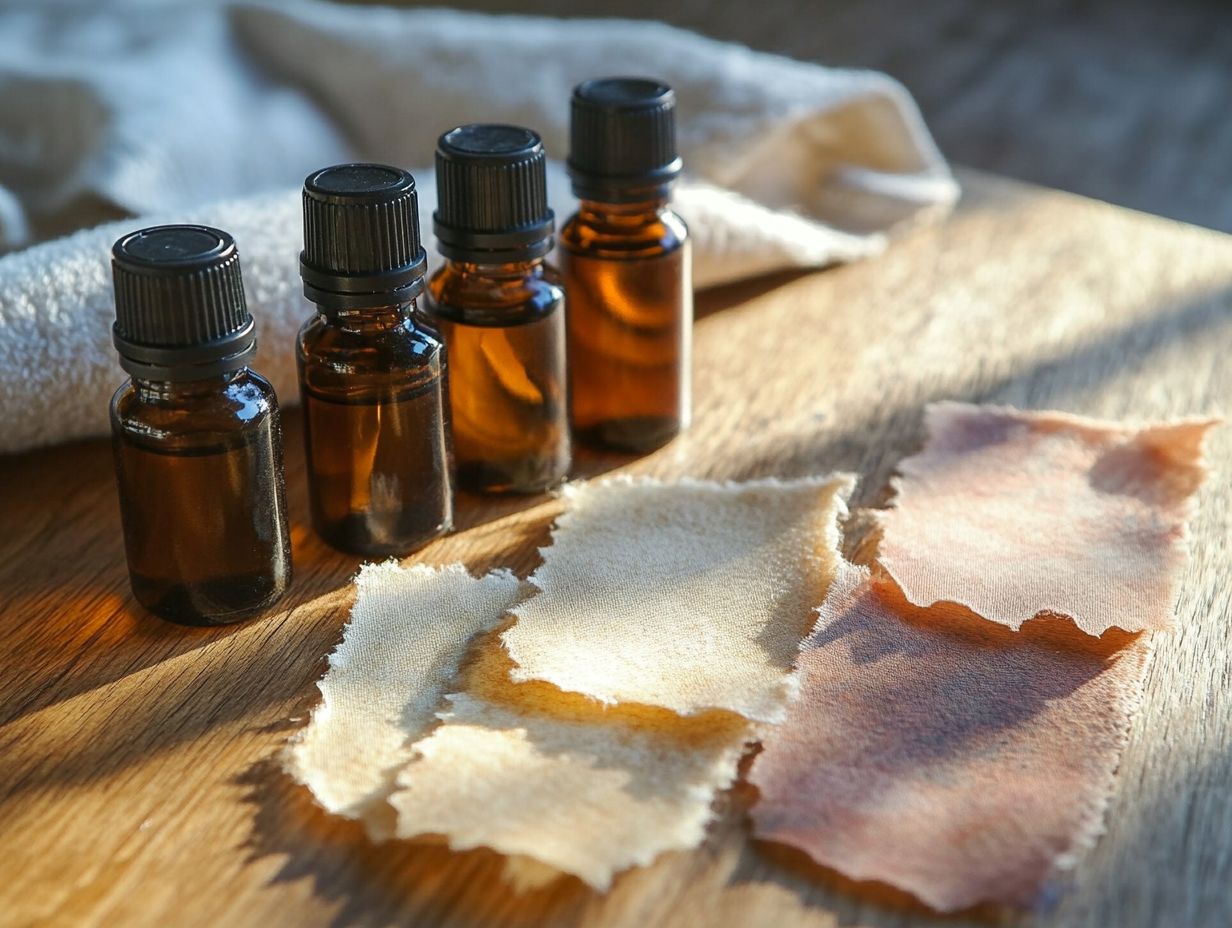
- Essential oils can effectively remove oil-based, ink, food and beverage, blood, coffee, and odor-causing stains.
- Top essential oils for stain removal include lemon, tea tree, lavender, and eucalyptus, each offering unique benefits.
- Essential oils can be used for stain removal through spot treatment, pre-soaking, as a laundry detergent booster, and in homemade spray remedies.
What Types of Stains Can Essential Oils Remove?
Essential oils have become popular solutions for effectively and sustainably addressing a variety of fabric stains, from oil and ink to food and beverage marks and even blood stains. These natural methods present a safe choice compared to traditional cleaners, making them especially beneficial for individuals with chemical sensitivities and allergies.
By utilizing the stain-fighting power of essential oils like lemon essential oil, you can elevate your laundry day experience, achieving remarkable stain removal results without the harsh repercussions often associated with synthetic products. You can also use these oils in your homemade cleaning solutions for effective stain treatment.
1. Oil-based Stains
Oil-based stains can be particularly tricky to tackle, but fear not turning to essential oils like lemon essential oil, combined with gentle soap made from vegetable oils, castile soap, or hydrogen peroxide, can lead to impressive results.
When confronted with these stubborn stains, it s crucial to act quickly; allowing time for the oil to settle can drive it deeper into the fabric or surface. To harness the power of lemon essential oil, mix a few drops with a tablespoon of castile soap to create a potent yet gentle cleaning solution, or use DIY stain removal techniques for effective cleaning.
For instance, on a greasy kitchen counter, this combination works wonders, breaking down cooking oil residues and leaving behind a spotless finish without resorting to harmful chemicals.
Alternatively, hydrogen peroxide, renowned for its stain-fighting prowess, can be diluted with water and applied directly to the stain. Just be mindful when using it on colored fabrics.
Choosing non-toxic cleaners is a brilliant way to tackle everyday messes with ease! It not only fosters a safer home environment but also leaves surfaces clean and fresh, free from the adverse effects that often accompany harsh chemical products.
2. Ink Stains
Ink stains, whether from pens or markers, present a formidable challenge in fabric care. However, essential oils can serve as an elegant and natural solution when paired with household staples like baking soda or vinegar.
These remedies assist in lifting those stubborn stains and infuse your fabric with a delightful fragrance. Act quickly to prevent the ink from setting!
Begin by gently blotting the stain with a clean cloth to absorb as much ink as possible before it can set. To make a DIY stain remover, mix a few drops of essential oil like tea tree or lavender with a tablespoon of vinegar. Dab this mixture onto the stain with a clean cloth, taking care to gently pat rather than rub, as rubbing might spread the ink even further.
After treating the stain, remember to rinse the fabric with cold water to achieve the best results and ensure there’s no stain residue left behind.
3. Food and Beverage Stains
Food and beverage stains, like the notorious coffee, wine, tomato sauce, and vegetable glycerin, can be effectively managed with homemade stain removers infused with essential oils to amplify their cleaning power.
These natural solutions provide an eco-friendly cleaning method and fill your space with refreshing fragrances, elevating your mood as you tackle the mess. For example, try mixing tea tree oil with vinegar to create a formidable stain-removing mixture that excels at cutting through greasy or oily residues left behind by indulgent meals.
A spray featuring lemon essential oil can work wonders on fruit juice stains. Its natural acidity helps dissolve stubborn marks.
By choosing these homemade remedies, you can enjoy the benefits of non-toxic ingredients that are gentler on both the environment and your household. This approach is a far more prudent choice than relying on harsh chemical-based cleaners.
4. Odor-causing Stains
Odor-causing stains can linger long after the initial spill, but essential oils like tea tree and lavender can be your secret weapons in neutralizing unpleasant scents. They are part of a comprehensive stain removal strategy.
Using essential oils not only eliminates odors but also helps kill germs, adding an extra layer of cleanliness. Mix a few drops of tea tree oil with a natural cleaning agent like vinegar or baking soda to lift pesky marks from your fabrics.
Similarly, lavender oil, known for its calming scent, can be combined with water in a spray bottle to create a delightful fabric refresher. This method deodorizes and leaves a refreshing fragrance, turning your laundry routine into an enjoyable experience.
Which Essential Oils are Best for Stain Removal?
When selecting essential oils for stain removal, consider standout options known for their remarkable stain-fighting properties. Lemon essential oil, tea tree essential oil, lavender essential oil, and eucalyptus essential oil each bring unique cleaning benefits while imparting delightful fragrances.
1. Lemon Essential Oil
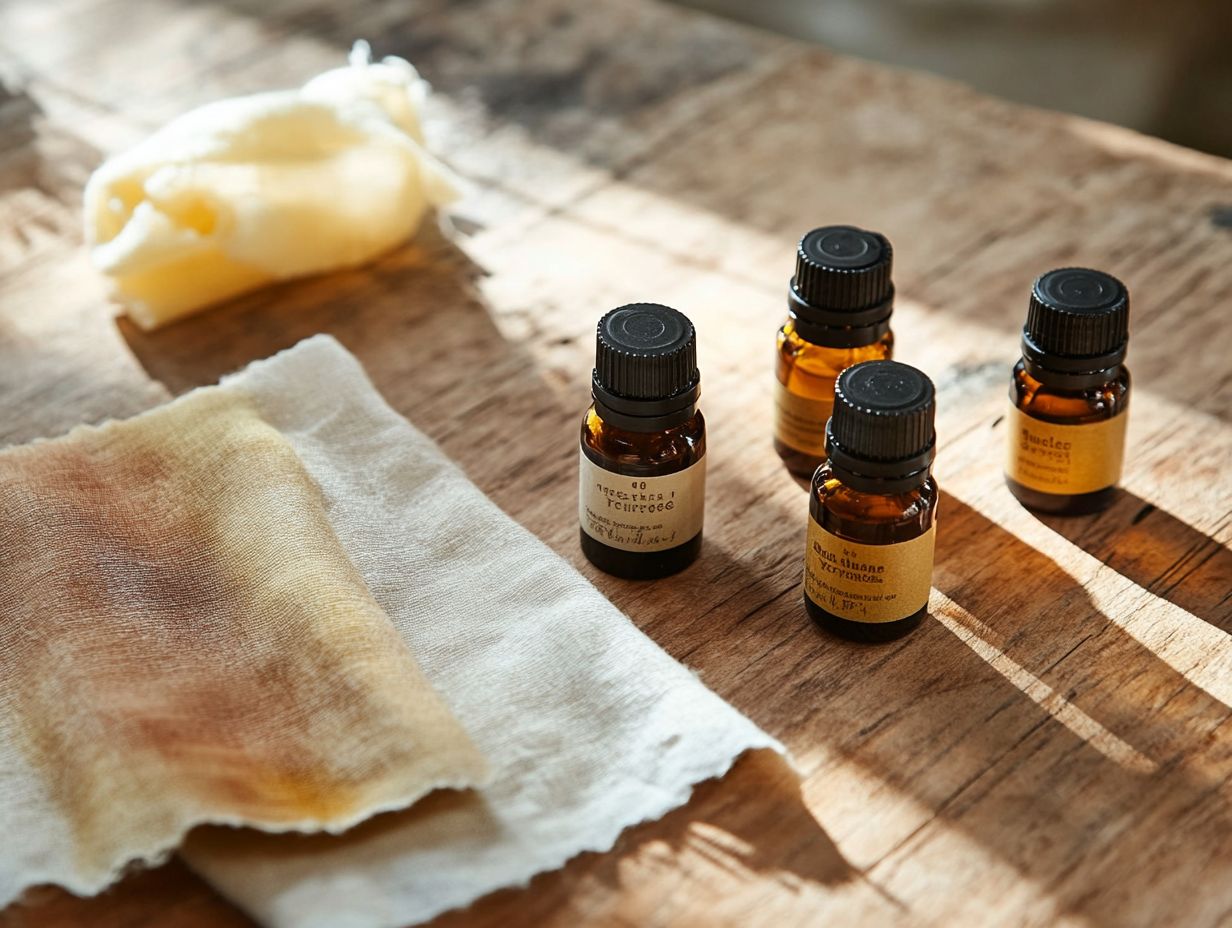
Lemon essential oil is celebrated for its remarkable stain removal capabilities. It s an exceptional choice among natural products for tackling even the toughest stains.
This essential oil lifts away unwanted marks and boasts natural antibacterial properties. It helps eradicate lingering odors and adds an extra layer of cleanliness to your fabrics.
The fresh, zesty scent of lemon oil ensures your items smell delightful long after the stain has vanished. It excels particularly well against persistent grease, ink, and food stains that often plague clothing and upholstery.
To make the most of its power, blend a few drops of lemon essential oil with baking soda to create a paste for stubborn areas. You can also incorporate it into your homemade laundry detergent to elevate your cleaning results while infusing a refreshing aroma into your laundry.
Try using sunlight stain removal techniques or other laundry hacks for tough stains.
Give these natural stain removers a try and enjoy a cleaner, fresher home today!
2. Tea Tree Essential Oil
Tea tree essential oil is not only celebrated for its delightful aroma but also for its remarkable stain-fighting abilities. It s an essential ally in your natural stain removal toolkit.
This essential oil wields powerful germ-fighting properties, effectively tackling stubborn stains like food, grease, ink, and even old marks.
Its versatility allows you to blend it seamlessly with other ingredients, such as baking soda or vinegar, crafting effective cleaning solutions tailored to your needs.
Create a powerful paste with tea tree oil to banish those stubborn stains today! Combine a few drops of tea tree oil with water in a spray bottle and apply it directly to the affected area. For tough stains, mix tea tree oil and baking soda to form a paste; apply it, let it sit, and then rinse away to reveal cleaner fabrics and surfaces.
By harnessing this natural remedy, you not only boost the effectiveness of your cleaning arsenal but also cultivate a healthier home environment.
3. Lavender Essential Oil
Lavender essential oil stands out not just for its calming aroma but also as a formidable ally against odor-causing stains. It s an essential addition to your fabric care and natural cleaning routine.
This versatile oil tackles a wide range of stains, from coffee spills to greasy fingerprints, while neutralizing unpleasant odors that often tag along. Add a few drops of lavender essential oil to your laundry, and enjoy the fresh scent of your clothes, free from stubborn marks.
You can also blend it with vinegar and water to make an exceptional cleaning spray for surfaces such as countertops or upholstery, effectively lifting stains while enveloping your space in a soothing fragrance.
The germ-fighting properties of lavender enhance its utility, making it an excellent choice for sanitizing items like gym bags or shoes. Using lavender as a natural stain remover can effectively tackle tough stains on white fabric.
4. Eucalyptus Essential Oil
Eucalyptus essential oil is celebrated not just for its distinctive fragrance but also for its remarkable stain-fighting prowess, making it an excellent choice for natural stain removal solutions. This oil boasts powerful germ-fighting properties, effectively combating grease, food residues, oil stains, and vinegar stains.
Its natural astringent qualities work wonders in breaking down stubborn dirt, making cleaning easier. When incorporating eucalyptus essential oil into your homemade cleaners, blend it with ingredients like vinegar, baking soda, or hydrogen peroxide a common household cleaner. This combination amplifies its effectiveness while refreshing your space.
Unlike other essential oils, eucalyptus offers a unique blend of cleaning strength and a soothing scent. It’s an outstanding option for creating a fresh and inviting home environment and removing wine stains or tomato stains from fabrics.
How to Use Essential Oils for Stain Removal?
Using essential oils for stain removal can be remarkably simple. Employ several effective techniques, from spot treatment and pre-soaking to crafting a homemade stain remover spray. You’ll have an arsenal at your disposal to tackle various fabric stains and their lingering residues.
1. Spot Treatment
Spot treatment is a very effective method for tackling localized fabric stains. You can apply essential oils directly to the affected area for maximum impact before rinsing the stains away.
This method works well with lemon essential oil or eucalyptus oil. It is particularly advantageous for stubborn marks from food, grease, blood, or ink.
Start by selecting the right essential oil based on the type of stain you’re facing. Use tea tree oil for tough grease or lavender for general stains.
Dilute your chosen essential oil with a carrier oil (a base oil used to dilute essential oils) or water to avoid damaging the fabric. Apply the solution gently onto the stain and let it rest for several minutes.
Once the treatment is complete, rinse the area with cool water to remove the oil and loosened stain residue. Let the fabric air dry and inspect it once dry to see if any follow-up treatments are needed for stubborn stains.
2. Pre-soaking
Pre-soaking your fabrics in a mixture infused with essential oils can elevate your stain removal game. This method allows the natural stain-fighting properties to penetrate the fibers and break down stubborn stains.
Combine essential oils like tea tree or lemon with warm water and a gentle detergent to create a potent stain-fighting soak. A good rule of thumb is to add about 10 drops of essential oil for every gallon of water, along with two tablespoons of detergent or castile soap.
For stubborn stains like grease or red wine, soak the fabric in this mixture for 30 minutes to an hour for outstanding results. Consider adding a quarter cup of white vinegar, which neutralizes odors and serves as a natural whitener.
This method will help your fabrics last longer and look better. Incorporating these natural laundry tips can make a significant difference.
3. Laundry Detergent Booster
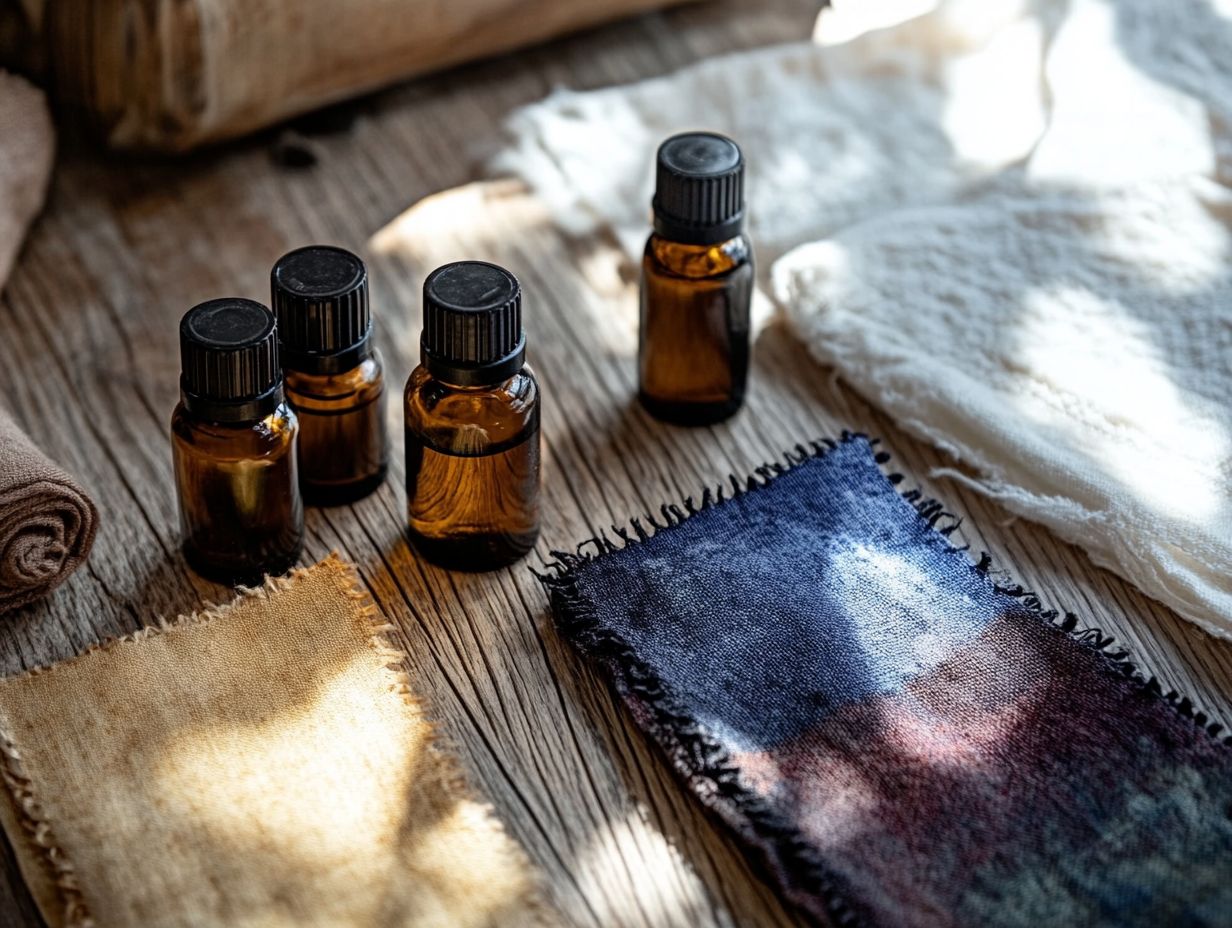
Integrating essential oils into your laundry routine as a detergent booster can significantly enhance stain treatment effectiveness. This approach makes it easier to tackle pesky fabric stains during the wash cycle.
By adding these natural fragrances and their cleaning properties, you can improve your laundry experience while avoiding harsh chemicals. Use about 10 to 15 drops per load, adjusting based on the load size and fabric type.
Popular choices like lavender or tea tree oil infuse your laundry with delightful scents and offer antibacterial benefits. For the best results, blend essential oils with natural products like baking soda or white vinegar to amplify cleaning power.
Always test for colorfastness first. Enjoy long-lasting freshness with every wash! Try these laundry hacks today and see the difference!
4. Homemade Stain Remover Spray
Creating a homemade stain remover spray using essential oils is simple and effective for tackling various fabric stains. It offers a safe alternative to harsh chemical cleaners.
This method helps you eliminate stubborn marks on clothing and upholstery while ensuring that the ingredients are non-toxic and gentle on your skin and the environment. Opting for natural products and DIY stain remover recipes can be particularly beneficial.
Grab a clean spray bottle you re about to make something amazing! You ll need water, white vinegar, baking soda, and your preferred essential oils think tea tree or lavender for their antibacterial benefits. You may also consider using a castile soap solution for enhanced cleaning.
Begin by mixing equal parts of water and vinegar in the spray bottle. Then, add a tablespoon of baking soda to help lift those pesky stains. A few drops of essential oils will boost the cleaning power and leave a delightful fragrance. Keep your homemade stain remover in an amber glass bottle to preserve its efficacy.
For optimal results, store your concoction in a cool, dark place to keep the essential oils fresh. Remember to shake well before each use. When you’re ready to apply it, always test the solution on a small, inconspicuous area first. Spray directly onto the stained fabric, let it work its magic for a few minutes, and then blot with a clean cloth.
Are There Any Risks of Using Essential Oils for Stain Removal?
Essential oils can provide a wealth of benefits for stain removal, but stay mindful of potential risks involved. These may include skin irritation, allergic reactions, and inhalation hazards that could arise from their use. Always follow the guidelines for safe cleaning.
1. Skin Irritation
Skin irritation can be a valid concern when using essential oils, especially if you have sensitive skin. Try a patch test before applying these oils directly to fabrics. This simple precaution can help you identify any adverse reactions before going all in, ensuring a safer experience.
Essential oils are cherished for their aromatic and therapeutic qualities, but they are composed of concentrated compounds that may trigger irritation or allergic reactions in some individuals. Factors like your skin type, the concentration of the oil, and the presence of other ingredients can all influence the likelihood of experiencing irritation.
To minimize potential risks, consider diluting essential oils with a carrier oil and starting with low concentrations. If you know you re particularly sensitive, exploring alternatives such as hydrosols or specific fragrance-free products might offer a gentler option without sacrificing the benefits. Brands like Jillee and Barb A. provide a variety of essential oil recipes designed for sensitive individuals.
2. Allergic Reactions
Allergic reactions can arise when using essential oils, making it crucial to identify any sensitivities before incorporating these natural products into your stain removal routine.
The symptoms of an allergic reaction can vary significantly from person to person. Some may encounter mild skin irritations, while others could face more severe respiratory issues or even anaphylaxis.
To manage this risk easily, conduct a patch test prior to widespread use. Apply a diluted version of your chosen essential oil to a small area of skin and monitor for any adverse reactions over the next 24 hours. This is particularly important for individuals like Susan G. and Janet, who have shared their experiences with essential oil sensitivities.
If you have known chemical allergies, it s especially critical to select essential oils that are less likely to contain those troublesome substances. Choosing reputable brands that cater to individuals with sensitivities can enhance your cleaning experience, allowing you to harness nature’s power safely. Brands like Dr. Bronner s and MyGreenFills are often recommended for their gentle formulations.
Have you tried making your own stain remover? Share your results!
Start making your own stain remover today and see the difference!
3. Inhalation Risks
Using essential oils in cleaning products can pose inhalation risks. It is essential to ensure proper ventilation and exercise caution when applying these potent natural substances in confined spaces.
When these concentrated oils are released into the air, they may lead to respiratory challenges, especially for those with pre-existing conditions like asthma or allergies. You need to know how to use essential oils safely.
Ventilate your spaces by opening windows or utilizing exhaust fans during use. Consider mixing the oils with a base oil, like coconut oil, to soften their potency. Using non-toxic cleaners and eco-friendly products can further minimize risks.
If you notice headaches or dizziness, stop using essential oils immediately. Act now to protect your health by using alternatives like vinegar or baking soda! Avoid using chlorine or ammonia because they are harsh chemicals.
Frequently Asked Questions
What are some laundry tips for using essential oils?
To get the most out of essential oils in laundry, mix them with products like baking soda and castile soap. Use amber glass spray bottles for easy storage. Remember to rinse stains thoroughly after applying your stain remover spray to avoid residue.
Can I use essential oils for stain removal?
Yes, essential oils can be effective natural stain removers for various fabric stains, including old stains. They provide a non-toxic alternative to harsh chemicals, making them ideal for fabric care.
Which essential oils work best for stain removal?
Certain essential oils are known for their stain-fighting abilities, such as lemon, tea tree, and lavender. Lemon oil is great for removing grease and food stains, while tea tree oil is effective against mold and mildew stains. Lavender oil is gentle and can be used on delicate fabrics. You can create a DIY stain remover recipe using these oils combined with other natural cleaning agents like hydrogen peroxide and baking soda for tough stains.
How do I use essential oils for stain removal?
To use essential oils for stain removal, mix them with other natural ingredients like vinegar, baking soda, or hydrogen peroxide to create a powerful homemade cleaning solution. Apply these solutions using a clean cloth for more precise application.
Alternatively, dilute a few drops in water or a carrier oil, such as coconut or olive oil. Apply the mixture directly to the stain and let it sit for a few minutes before washing as usual. You can also add a few drops to your laundry detergent for an extra boost. For a homemade stain remover, try mixing castile soap and baking soda with your essential oils in a spray bottle for a convenient stain remover spray.
Are there any precautions to take when using essential oils for stain removal?
Yes, it is important to always dilute essential oils before using them on clothing or fabrics. Undiluted oils can cause skin irritation and may also damage certain fabrics. Test a small, inconspicuous area first to ensure the oil does not cause discoloration. For added safety, use eco-friendly products and safe cleaning techniques to protect delicate fabrics and avoid chemical allergies.
Can essential oils be used on all types of stains?
Essential oils can effectively tackle various stains. However, some may need special care. For example, oil-based stains often need a solvent to break them down before applying essential oils. Discover the best way to tackle each stain for amazing results!
Different stains require different treatments. Vinegar, wine, coffee, and even blood stains might need unique approaches. Consider using natural products like vegetable glycerin or sunlight for certain tough stains.
Do essential oils leave a scent on the fabric after stain removal?
Some essential oils may leave a subtle scent, but it typically doesn t linger after washing and drying. If you re worried about lingering smells, add a few drops of a complementary essential oil, like lavender or citrus, to your laundry detergent. This can help neutralize odors, especially for tough stains like tomato and grease stains.
Don t let stains sit! Act fast and choose the right treatment for the best results. Try using essential oils for your stain problems today!

